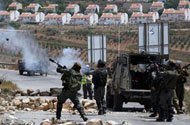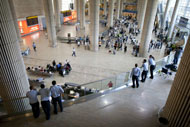
The protests over housing prices in Israel have been making headlines for the past two weeks and for good reason. Thousands of people have set up tents, demonstrated against the country’s high cost of living and have camped out on the streets of Tel Aviv, intent on not going home until their demands are met.
It’s an admirable sight to see so many people united for a cause and to see just how popular pressure works at its best. Israeli Prime Minister Benjamin Netanyahu feels the heat and knows he must do something to satisfy his people. However, the housing crisis in Israel is an internal Israeli issue, not one that directly impacts Palestinians. Still, it is difficult not to draw comparisons, to see the double standards Israel employs when dealing with crowd control when the crowds are Israeli.
So far— and we would only expect this of a “democracy”— no one has been injured or killed in Israel’s protests. That is admirable for any society, especially after the atrocities we have all seen being carried out in the Arab world during their revolutions against despotic regimes. Although Israelis protesting their government’s housing policies are not looking to topple Bibi, they are out in unprecedented numbers. Close to 300,000 people took to the streets of Tel Aviv on August 6, almost double the number of protesters a week earlier.
Watching these protests from the “other side of the fence”, Palestinians mostly just exhale with resignation. When Israel speaks of itself as a democracy, it is not lying completely. The protests over the past few weeks have proven it does respectfully handle its own citizens, that is, Israeli Jews. But across the line into the occupied Palestinian territories, it’s a different story.
Peaceful protests demanding rights are nothing new to the Palestinians. Having lived under Israeli military occupation for the past 44 years (not to mention the loss of homes and exile they experienced in 1948), protests have become second nature to them. During the first Intifada, mass protests took place every week, demanding an end to Israel’s occupation and the establishment of a Palestinian state.
Twenty years later, this goal has not changed but thanks to Israel’s policies, the battle has become even more complex. Today, there is the separation wall, over double the number of settlers and settlements, which have encroached on even more Palestinian land. This means the Palestinians have begun to protest, not only the occupation as a whole, but the wall, the confiscation of land and the denial of the simplest of rights to live in dignity. The outcome of these protests, however, is nothing like those in Tel Aviv, though. The face of Israel’s democracy on this side of the tracks is blurred beyond recognition.
When Palestinians protest, things don’t end as simply as packing up and going home at the end of the day. Each time the Palestinians go out to protest, they expect the worst and hope for the best. Israel does not adopt a policy of tolerance when it comes to Palestinian protesters, even when the protests are “peaceful.” Videos coming out of places like Nabi Saleh, a Ramallah-area village are horrifying. Weekly protests against expropriated land for a nearby settlement, much like those that take place in Bilin and Nilin, have ended in brutal violence against the Palestinians and foreign activists who come in solidarity. Israeli soldiers beat men, women, even children, shoot teargas directly at protesters and rubber-coated steel bullets, many times leading to death. If these kinds of methods were employed in the middle of Tel Aviv, there would definitely be an outrage from Israelis themselves and most likely from the rest of the world.
But the world has largely come to know that Palestinians living under Israel’s occupation are delegated to third class citizens (at best) just by their nationality. When Israel quells a Palestinian protest, it is for one purpose only. To show them who’s boss, to silence and intimidate a people so that more land can be taken and less voices demanding basic rights and freedom can be heard.
So, when Israeli commentators balk at comparisons between the Arab spring and what some have dubbed the Israeli spring, they should think again. True, the Israeli government does not crush its own people in their protest of housing prices. That sort or repression is what Arab peoples have been rebelling against in the first place. But they shouldn’t balk too much. Just cross the “border” into Palestine and Israel has a whole new face. The sort of crack down seen in Gaza, in Nabi Saleh, in Hebron and in Bilin is not too far from the scenes of repression we all cringed from in Tahreer Square, in Diraa, Syria or in Sana, Yemen. Here, Israel is not the democracy the Israelis praise or the world sees on the streets of Tel Aviv. Here is the Israel the Palestinians know. Here is repression at its worst.
Joharah Baker is Director of the Media and Information Department at the Palestinian Initiative for the Promotion of Global Dialogue and Democracy (MIFTAH). She can be contacted at [email protected].









